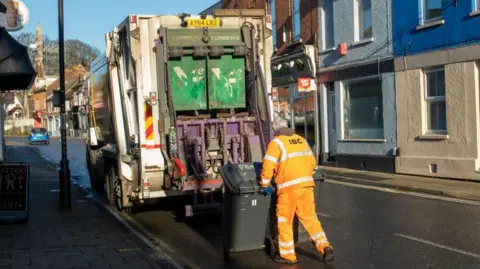 Getty Images
Getty ImagesCouncil tax bills in England are set to rise by up to 5% next April, after the government confirmed it was sticking with the current cap on increases.
Communities Minister Matthew Pennycook told the Commons this was the “right threshold”, as he pointed to the pressures on council budgets.
It means the average household faces an above-inflation increase of more than £100 to their to their council tax bill next year.
Pennycook said the government expects an extra £1.8bn to be raised through council tax in 2025/26.
But the Conservatives claimed Labour had left a “black hole” in council finances.
Under current rules, councils in England providing social care services can increase tax rates by up to 5%, while others can increase rates by up to 3%.
Councils who want to increase bills above this level must get permission from the government or hold a referendum.
According to government figures, the average band D council tax set by local authorities in England for 2024-25 was £2,171 – an increase of £106 or 5.1% on the previous year.
On Wednesday, the prime minister’s press secretary told reporters the 5% threshold set by the previous government “remains the same”.
It came after Conservative leader Kemi Badenoch pressed Sir Keir Starmer during Prime Minister’s Questions over whether the cap would be kept in place, with the PM sidestepping the question.
Answering an urgent question on the issue in the House of Commons on Thursday, Pennycook defended the decision to keep the cap.
The minister said the government was committed to protecting the most vulnerable through the 25% discount on council tax for people who live alone and other support schemes.
He added that this means more than eight million households do not pay a full council tax bill.
Pennycook was also challenged over the financial pressures facing councils.
Liberal Democrat MP Lee Dillon said his party was “deeply concerned that people are simply paying more council tax for fewer services”.
He highlighted the increased costs for councils from inflation, wages and demand for local services and urged the minister to ensure they did not have to close libraries, cut bus routes or reduce road repairs as a result.
In response, Pennycook said: “The government certainly recognises the pressures on local authorities and the burdens placed on households as a result of 14 years in which local government was run down.”
“We are determined to turn that situation around,” he added, pointing to an extra £4bn in new funding for councils in last month’s Budget.
The Local Government Association has welcomed the extra funding for councils, but warned they still face significant pressures in areas like adult and children’s social care and homelessness support.
The County Councils Network also said the money “does not eradicate councils’ funding gap”, meaning they would “have little choice but to raise council tax and still need to take difficult decisions over services to balance their budgets”.
Conservative shadow communities minister David Simmonds claimed the government had left a £2.4bn “black hole” in councils budgets.
“Answers to parliamentary questions show that the government is expecting spending power to increase by £3.7bn, funded by grants of £1.3bn,” he told the Commons.
He added: “Whilst nobody would want to see the [council tax rise] referendum limit scrapped simply to bail out central government, the announcement of the 5% constrains local authorities when it comes to their fundraising.
“Will it be our High Streets through increased business rates or will it be other council services through significant cuts that will need to fill their £2.4bn black hole?”
Pennycook rejected the figure, saying it did not take account of more than £300m raised in business rates and an expected £300m in additional new housing.
He pointed out that the 5% cap on council tax rises was in place when the Conservatives were in government and called on the party to clarify whether they believed it should be abolished or reduced.




